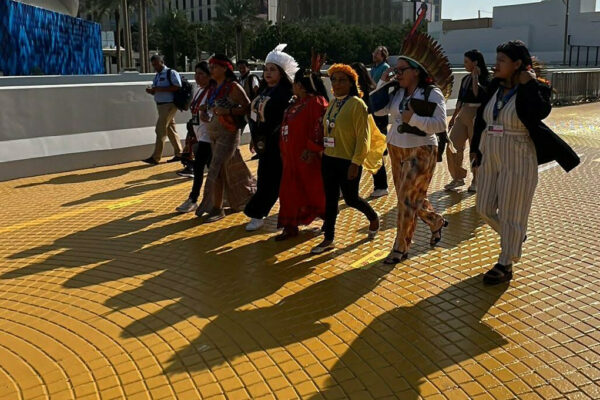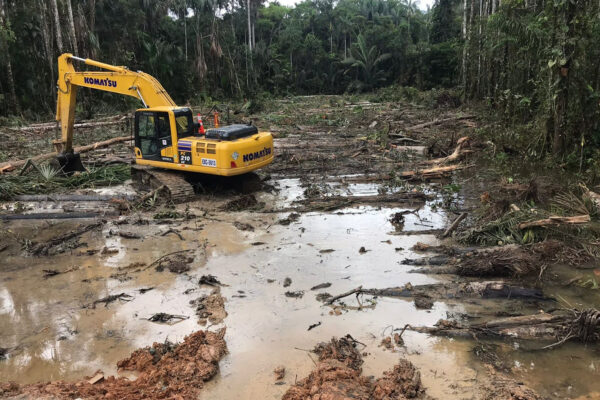Sitting atop a black-rock outcrop near a grassy mountaintop in Colombia, Roberto Perez, the political chief of the U’wa people, gazes over the world that he and his ancestors have inhabited for thousands of years. In the valley below the Andean peaks, bulldozers and workers in yellow hard hats are clearing the land for an exploratory oil well to be drilled by Los Angeles-based Occidental Petroleum Corp. (OXY) The government believes the land holds more than half of Colombia’s oil reserves and has contracted Occidental to find it.
The nature-worshipping U’wa adamantly oppose the exploration. For them, oil is the “blood of Mother Earth,” and in the past they have threatened ritual mass suicide if anyone tries to extract it. “The government says this oil production will bring development for the country,” says Perez, chewing a wad of coca leaves. “But it will also destroy the region environmentally, ecologically, and culturally.” The U’wa have reason to be concerned: Leftist rebel attacks on an Occidental pipeline just north of their land have bled 2.3 million barrels of oil into the ground since it was built in 1986, according to the state oil firm Ecopetrol. The U’wa say the project forced the local people, called the Guahibo, into the cities, where many of them now beg for a living.
But Occidental emphatically denies that the Guahibo were affected by the project – and says it doesn’t believe the U’wa will be affected either. The company has held dozens of meetings with community groups and says it is trying to meet all their concerns. It is requiring contractors to stay within a fenced-off work site so that entrepreneurs won’t be tempted to set up bars and brothels in the area, and is hiring only local laborers to prevent migrants from flooding in. Occidental has also spent some $140,000 on educational, environmental, agricultural, and basic infrastructure projects in communities closest to the project.
Not long ago, the words of tribal leaders such as Perez would not have been heard outside the forests where they were uttered. Now, they echo around the world – through myriad Web sites, Western protest campaigns, and a growing number of conferences on globalization. The plight of indigenous groups is penetrating the boardrooms of multinationals, which are being forced to respond as never before to protect their reputations and brand names. Nowhere are the issues more contentious than in investments, such as Occidental’s, that involve extracting natural resources in developing nations. Many of these projects have long been marred by corruption, military atrocities, ecological damage, and social upheaval.
FAIR SHARE. A close look at some of the world’s most celebrated clashes between indigenous cultures and multinationals, shows that the issues are vastly complex. While most U’wa clearly want Occidental to abandon the project, the Colombian government remains determined to develop the nation’s oil reserves, which it views as vital to economic development. “We are just a contractor working with the government,” says Occidental spokesman Larry Meriage. “If we pulled out today, that project would not die.”
More often than not, in fact, local peoples aren’t clamoring for foreign oil and mining companies to pull out. What they really want is a fairer share of the revenues and job opportunities. That certainly is the case in Chad, site of a controversial oil drilling and pipeline project partly financed by the World Bank.
That’s also what you will hear from Janas Natkime, who lives half a world away from the U’wa in another of the world’s most isolated regions – West Papua, Indonesia. Natkime, who lives in a clapboard shack with chicken wire for window panes, is one of four recognized leaders of the Amungme tribe. Only 40 years ago, most Amungme had never seen an outsider and still lived a Stone Age existence. That changed with the arrival of New Orleans-based Freeport-McMoRan Copper & Gold Inc. in the 1960s. Under an agreement with President Suharto, Indonesia’s corrupt former dictator, Freeport has chiseled away two mountains, which once rose higher than 3,650 meters, to extract the world’s largest recoverable gold reserves.
The Amungme see the mine, which employs 6,000 people, as their only means of financial viability. But they are pressing Freeport to clean up the mine tailings that has turned their water gray. They are angry that only 1% of the net revenue of $1.6 billion is invested in their community. “In the era of globalization, I want the Amungme to hold an equal share and an equal position with Freeport,” says Natkime. Freeport didn’t even start spending on community development until riots in 1996 left three tribespeople dead and fifteen injured, which forced the company to shut down the mine for three days. In August, Freeport signed a pledge with the Amungme and the Kamoro, another local tribe, to construct modern housing and offices for elders and to establish an earth-moving and levee-maintaining company to provide jobs for local people. It is also launching an agricultural project on land reclaimed from the waste-rock and silt dumped by Freeport.
Such examples illustrate how the world of global investing is changing. Multinational corporations once were able to brush off environmental or human-rights concerns in the Third World. Oil and mining companies needed only to cut deals with central government officials – and they could count on Western governments to protect their interests. Even though the deals often brought billions in export earnings, the proceeds from these wells and mines often lined the pockets of such strongmen as Suharto, Zaire’s Mobutu Sese Seko, and Nigeria’s Sani Abacha.
UNDER PRESSURE. Indeed, studies show that countries that depend on windfalls from natural resources tend to remain economically backward, since governments have little incentive to nurture education or the industries needed for development. Some 23% of countries where at least one-quarter of the economy depends on exports of primary commodities experience military conflict, according to the World Bank. Countries with no commodities exports have only a less than 1% chance of conflict.
Activists and environmental groups have put heavy pressure on multinationals, governments of developing nations, and the World Bank – which funds many such projects – to show there are humane, eco-friendly, and equitable ways to drill and mine in poor nations. Since 1995, for example, Berkeley (Calif.)-based Project Underground has backed lawsuits and lobbied shareholders, creditors, and U.S. government agencies to oppose Freeport’s practices in Indonesia. The U’wa cause has been taken up by celebrities, and activists have demonstrated outside the Bel Air home of Occidental Chairman Ray R. Irani. “Global capitalism has gone too far, too fast, and cut corners,” explains Danny Kennedy, Project Underground’s director.
On top of this, oil and mining companies now have to answer to institutional investors, such as CalPERS, the pension fund for state employees in California. And they must meet increasingly stringent environmental and social standards to get financial backing and political-risk guarantees from the World Bank for overseas projects. “There is an increasing demand for accountability,” says Gerard P. Matthews, a London-based Royal Dutch/Shell Group (RD) executive who works on company human-rights policy. “It’s no longer a possibility for companies, individuals, or governments to cover things up or be secretive.”
The result is shaping up as a new era of corporate responsibility. Multinationals are hiring human-rights advisers, drafting and enforcing codes of conduct, appointing outside monitors, and improving operating practices. They are developing global standards of conduct, such as procedures for security of their installations. They are putting local people on boards of directors and urging government ministers and generals to adhere to international human-rights standards, lest their misdeeds reflect poorly on the investors, too. “Acknowledging that is a huge change, and very few companies were doing it until just a few years ago,” says Aron Cramer, vice-president of San Francisco-based Business for Social Responsibility, a group that helps companies establish human rights and labor standards.
European companies have been ahead of their U.S. rivals in the corporate responsibility movement. Goran Lindahl, CEO of the Swiss contractor ABB, dispatched engineers who were bidding to build Malaysia’s Bakun Dam to Borneo in the mid-1990s, where they spent time in traditional longhouses assessing the needs of villagers who would be displaced. In the end, plans for the dam were called off, and it has yet to be built.
Shell also has been a leader of late, in part because it has had to make amends for past offenses. International condemnation of the oil giant’s operations in Nigeria peaked in 1995, when the government hanged Ken Saro-Wiwa, an internationally known writer who had crusaded for his Ogoni people against big oil, for allegedly inciting violence. While corrupt central government officials skimmed billions of oil revenues, the Ogoni got nothing and saw their land contaminated by oil spills. Shell was blamed for tolerating these conditions and not doing enough to save Saro-Wiwa’s life.
After a huge public outcry, Shell acknowledged that it had a responsibility for human rights. It has since pulled out of controversial projects in Chad and Colombia. And it is trying to improve its environmental and human rights practices in Nigeria, which, with an output of 2.2 million barrels of oil a day, remains vital to Shell’s business. Human Rights Watch Program Director Arvind Ganesan, who monitors Shell’s conduct in Nigeria, says the company has turned around. “There’s a willingness to make sure their operations don’t contribute to human rights violations,” he says. Ganesan and others say Shell’s reports on its own human rights progress and environmental impact are models for other companies.
GRASSROOTS. One clear example of how activists are prompting a change of heart in the U.S. is their campaign against Home Depot (HD). The Rainforest Action Network, based in San Francisco, used organized pickets of Home Depot stores and protests at shareholder meetings to stop the home-improvement supply chain from selling hardwoods from endangered forests in Southeast Asia, South America, and Canada. Home Depot, which sells about $10 billion worth of lumber each year, said it would give preference to wood certified as eco-friendly by an outside agency that tracks timber production. A host of other lumber suppliers and homebuilders have promised to do the same.
As important as such efforts are, it will be many years before they produce noticeable gains for the world’s poor. Only a handful of multinationals have gotten serious about cleaning up their corporate practices. Even if companies are well-intentioned, the real test is whether the new standards and codes will mean anything in practice. And governments often continue to side with multinationals over indigenous peoples. The U’wa, for example, recently lost a key battle in Colombian courts to block Occidental’s project.
Even though their suit failed, Western activists will make sure that oil companies keep paying attention to U’wa concerns. “The whole world knows about us,” says Ebaristo Tegria, a young U’wa attorney. And in the new, wired world of global political action, there are few places where a multinational working in a sensitive environment can simply pile up profits in peace.













